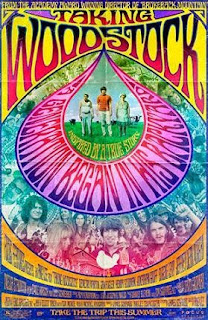Taking Woodstock

There was quite a bit of media coverage of the 40th anniversary of the Aquarian Exposition in White Lake, New York, better known as Woodstock. So much so that I'm sure many were driven crazy by it, especially those who were born long after the concert took place. Now, a few weeks after the anniversary, comes Ang Lee's film Taking Woodstock, and once again your enjoyment of the film will probably be directly proportional with your level of nostalgia for the sixties.
I was only eight when the concert took place, and completely oblivious. In fact, at that tender age I probably wouldn't have heard of one of the acts that played there (I'd heard of the Beatles, but was sadly lacking in my appreciation of Sweetwater and Quill). But, as regular readers of this blog know, I am now firmly stuck in the sixties, as if making up for the fact that I spent the decade watching Captain Kangaroo. Hanging on my living room wall is a framed original poster of the event that I bought many years ago for a not inconsiderable sum.
Lee's film is just okay, even to frustrated hippies such as myself, especially because of the pedestrian script by James Schamus. It concerns the behind the scenes events of how the festival ended up where it did. Originally scheduled to be in Saugerties, New York, which was just a few miles from Woodstock, it was moved to Walkill, but then townspeople withdrew their approval. Enter Elliott Tiber (called Teichsberg in the movie), whose parents owned a dilapidated motel in pastoral White Lake, where there were more cows than people. Elliott (played by Demetri Martin) is also the president of the local chamber of commerce, and has a permit for his arts festival, which normally consists of him playing records over a loudspeaker.
He contacts the backers of the festival, including Michael Lang, who is played with Zen serenity by Jonathan Groff (who is specializing in recreating classic hippiedom, after playing Claude in the Broadway production of Hair). After having seen Lang give a talk, Groff nails him perfectly, as Lang still appears to have that inner peace, as well as an abundant head of hair. A local dairy farmer (Max Yasgur, played amusingly by Eugene Levy) agrees to let them use his farm as the concert site, almost relishing how it will annoy his neighbors.
Elliot's parents are old world Jews who are resistant to the idea of being overrun by hippies, until the cash stars flowing in. This is especially true of his mother, played cartoonishly by Imelda Staunton, who appears to not have one laudable character trait. The spine of the film involves Elliott learning to have the courage to leave his parents to fend for themselves (as well as come to grips with his homosexuality), and it's all very conventional stuff. So is a subplot involving a friend, Emile Hirsch, who was a Nam vet and suffers flashbacks.
What gives Taking Woodstock its occasional power is what happens around the edges, as the film really seems authentic in expressing just what it was like to be there for those three days. There's a terrific scene in which a state trooper (wearing a flower in his helmet) gives Elliott a ride on the back of his motorcycle to the festival field. They weave through the jam of traffic and people, young people in the full flush of individual expression (and drug-induced euphoria) while the music can be faintly heard in the distance. Elliott is urged to visit the show by his father, while they stand by a lake, watching people skinny-dip, in a scene that isn't salacious but instead celebratory of a certain time and place.
Elliott then is invited into a VW bus by a hippie couple (Paul Dano and Kelli Garner). I had heard about this scene and was dreading it, because in movies about the sixties there's always a scene in which a person takes their first acid trip, and the director and cinematographer try to recreate an experience that is probably unreproducible. But this one comes closer to others. As he listens to Ultimate Spinach, Elliott starts to see colors bleed and images shimmer. When they leave the van and look out at the sea of humanity, the hills undulate. Great stuff.
The music itself is only on the periphery. We don't see any of the bands, either in stock footage or as played by modern actors. Lee does give a nod of homage to Michael Wadleigh's concert film by frequently utilizing split-screen photography, but we only hear the music on the soundtrack (including Richie Havens, Arlo Guthrie, Canned Heat, Jefferson Airplane, and Crosby, Stills, and Nash--it must have been a rights nightmare). In this way Taking Woodstock would be an ideal companion to the original film.
Schamus' script, though without much insight into the characters, is not completely idealistic. At the end of the show, as Boy Scouts are picking up the garbage, Lang rides into view on a horse, like some sort of hippie knight. He mentions that he's next going to put on a Rolling Stones show in California. This would of course be Altamount, which was the tragic counterpoint to Woodstock. He also speculates that everyone involved would probably end up suing each other. The end was in sight--3 Days of Peace and Music would seen be owned by corporate conglomerates and would later be packaged as "classic rock." But it was something while it lasted.


Comments
Post a Comment